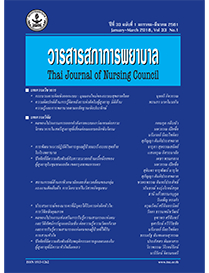Development of a Caring Procedure for Hospitalised Terminal Cancer Patients
Keywords:
development of a caring procedure, terminal stage of life, cancer patients, hospitalisedAbstract
Abstract
Objective: To develop a procedure to care for cancer patients in the terminal stage
of their lives.
Design: Developmental research.
Procedure: This study was conducted in 2 stages. In the frst stage, a caring procedure
for hospitalised terminal cancer patients was developed. The procedure development integrated
(i) the Australian Research Council’s clinical procedure development concept; (ii) the
palliative care framework under the standard nursing process (known as LIFESS) proposed
by Thailand’s National Health Security Offce; (iii) empirical evidence from 8 studies;
and (iv) Maharaj Nakhon Chiang Mai Hospital’s palliative care procedure. In the second
stage, the feasibility of the procedure was assessed. The procedure was employed by
10 registered nurses who volunteered as primary nurses, in a 2-week experiment with
terminal cancer patients hospitalised in the volunteer nurses’ ward.
Results: The caring procedure for hospitalised terminal cancer patients was
implemented in 2 stages. The pre-operational stage involved (i) receiving the patients’
terminal-stage diagnosis; (ii) informing the patients and/or their relatives of the diagnosis,
to seek a mutual caregiving agreement; and (iii) providing information to assist the patients
and/or their relatives in selecting caregiving methods. The operational stage concerned
(i) preliminary assessment of the patients’ conditions; and (ii) implementation of the
procedure according to the caregiving plan. Based on the feasibility assessment, the procedure,
reviewed by 3 specialists, displayed a content validity index of 0.89. The experiment
with the patients showed that the volunteer nurses unanimously regarded the procedure
as being simple, practical, and suitable for the context of caring for this group of patients.
Downloads
References
2. Sangchat B. Death and dying concepts and nursing. Khon Kaen: Klungnana Vitthaya Press; 2004. (In Thai).
3. Nilmanat K. The end of life care. Songkhla: Orange Media; 2012. (In Thai).
4. Danpatong A. Humanized caring behaviors for endof-life patients perceived by registered nurse of Phrae Hospital. Journal of Nursing Division 2009; 36(1): 15-26. (In Thai).
5. Khungjumpa R. Nursing care for cancer patients at end-of-life based on the resiliency framework: a case study in Bandung Crown Prince Hospital, Bandung, Udon Thani. [Master of Nursing Science Independent study). Khon Kaen: Khon Kaen University; 2009. (In Thai).
6. Maneepong S. Developing model for end-of-life care in critical medical unit, medicine nursing division, Srinagarin Hospital. [Master of Nursing Science Independent study). Khon Kaen: Khon Kaen University; 2008. (In Thai).
7. Klaypayak O. A factor analysis of end-of-life care in the intensive care unit. (Master of Nursing Science Thesis). Bangkok: Chulalongkorn University; 2006. (In Thai).
8. Chaiyasen T. Development of spiritual care model for terminal cancer patients. [Master of Nursing Science Independent study]. Khon Kaen: Khon Kaen University; 2011. (In Thai).48
9. Arom Y, Nilmanit K, Chailanka P. Experiences of family of critically dying patients. Journal of Nursing and Health 2009; 32 (4): 33-43. (In Thai).
10. Seekumnerd S. Care for terminal-stage cancer patients in community. [Master of Nursing Science Thesis]. Bangkok: Huachiew Chalermprakiet University; 2009. (ณn Thai).
11. Hanprasitkam K, Patoomwan A, Churaitatsanee S, Paisansuthideth U. The Effect of an end-of-life care education program on nurses’ knowledge, attitude, and practice in caring for end-of-life Patients. Rama Nurs J 2011; 17(1): 126 140. (In Thai).
12. Pramoj Na, Ayutthaya P, Monkong S, Intarasombat P. The effect of a supportive educational end-of-life care program on knowledge and perceived self-effcacy of professional nurses. Rama Nurs J 2011; 17(1): 141-156. (In Thai).
13. Wamalun S, Thamnu A, Tumtimhin S, Boonmana T, Treerodporn P, Jitpimonsuk N. Development of holistic care model for end-stage cancer patients in Ubon Ratchathani Cancer Center. Nontaburi: Department of Medical Services, Ministry of Public Health; 2008. (In Thai).
14. Chitchun Ch. Evaluation of the implementation of clinical practice guidelines for end of life care at sub intensive care unit, Medical Section, Maharaj Nakorn Chiang Mai Hospital. [Master of Nursing Science Independent study). Chiang Mai: Chiang Mai University; 2007. (In Thai).
15. Faculty of Medicine, Chiang Mai University. Policies and approaches (palliative care) in nursing department. Maharajnakorn Chiang Mai Hospital. Chiang Mai: Chiang Mai University; 2007. (In Thai).
16. National Health and Medical Research Council. A guideline to the developmental implementation and evaluation of clinical practice guidelines [Internet]. 1999 [cited 2015 July 27]. Available from: https:// www.nhmrc.gov.au
17. Rattanapathumwong P, Yooujaiyen M. Development of clinical practice guidelines for pain management among postoperative patients in the post-anesthesia care unit in Ranong Hospital. Journal of Boromarajonani College of Nursing 2014; 30(1): 86-99. (In Thai)
18. National Health Security Offce. Caring for end-of-life patients [Lecture handout]. Nonthaburi: National Health Security Offce (Central) (in Thai).
19. Thongchai CH, Nantachaipan P. Survey on the use of practice. Chiang Mai: Chiang Mai University; 2004. (In Thai).








